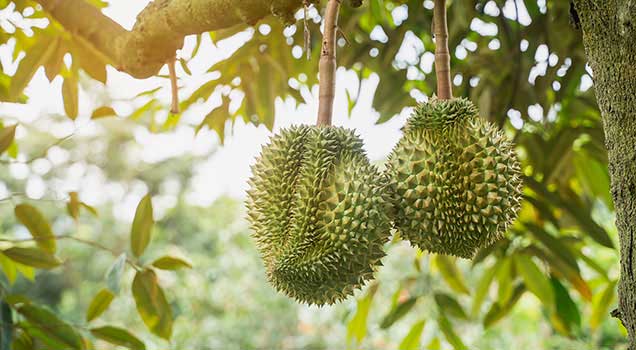The History of Penang Durians
Durians have been cultivated in Penang for over a century, with the island's unique microclimate and fertile soil creating ideal conditions for growing this prized fruit.
The first commercial durian orchards in Penang were established in the early 1900s, primarily in the hilly regions of Balik Pulau. The industry expanded significantly in the 1970s and 1980s when new varieties were developed.
Today, Penang is renowned throughout Malaysia and internationally for producing some of the finest durians in the world, with varieties like Musang King, Red Prawn, and Black Thorn achieving legendary status among durian enthusiasts.
Timeline of Penang Durian Cultivation
-
1
Early 1900s
First commercial durian orchards established in Balik Pulau
-
2
1950s
Development of early named varieties and improved cultivation techniques
-
3
1970s-1980s
Expansion of durian orchards and development of premium varieties
-
4
1990s-Present
Penang durians gain international recognition and premium status
Cultural Significance

In Penang, durians are more than just a fruit—they're a cultural institution. The annual durian season is eagerly anticipated by locals and tourists alike, with durian-themed festivals and events celebrating the "King of Fruits."
Families often have traditions of visiting specific farms or vendors that span generations. There's a deep knowledge of durian varieties, with passionate debates about which ones are superior.
The durian trade has also created a unique economy, with experienced durian sellers who can select the perfect fruit becoming respected experts in their communities. Many Penang families have built livelihoods around durian cultivation for generations.
What Makes Penang Durians Special
Microclimate
Penang's unique combination of tropical climate, humidity levels, and temperature variations creates ideal growing conditions for durians. The island's hilly terrain provides excellent drainage and exposure to the elements, contributing to the fruit's complex flavors.
Soil Composition
The rich, loamy soil found in Penang's durian-growing regions is perfectly suited for durian trees. This soil composition, combined with natural mineral content, contributes to the distinctive taste profiles that make Penang durians so sought after.
Cultivation Expertise
Many durian farms in Penang have been operated by the same families for generations, with cultivation techniques and knowledge passed down through the years. This expertise results in careful attention to growing, harvesting, and selection processes.
Interesting Durian Facts
-
The name "durian" comes from the Malay word "duri" meaning thorn, referencing the fruit's spiky exterior.
-
Durian trees can grow up to 50 meters tall and live for up to 100+ years.
-
A good durian usually weighs between 1-4 kg and contains less than 10 seeds.
-
Fully ripe durians will naturally fall from the tree. This is the ideal stage for consumption for those who prefer the most intense flavor and soft texture.
-
The fruit is rich in nutrients including potassium, fiber, iron, vitamin C, and B vitamins.
-
Due to its strong smell, durians are banned in many hotels, public transportation systems, and some public spaces in Southeast Asia.
-
A durian tree typically takes 4-5 years after planting before it produces its first fruits.
-
The British naturalist Alfred Russel Wallace described the taste of durian as "a rich custard highly flavored with almonds."
Evolution of Penang's Durian Industry
Early Traditional Farming
In the early days, durian trees were grown scattered throughout jungle areas or as part of diverse smallholder farms. Cultivation methods were primarily organic by default, with minimal intervention beyond basic clearing and maintenance. Durians were mostly consumed locally, with limited transportation options restricting their market reach.
Mid-Century Commercialization
The mid-20th century saw the beginning of more organized durian orchards, with more standardized spacing and greater attention to tree management. This period saw early breeding efforts to identify and propagate superior varieties, though many trees were still grown from seeds rather than grafts, resulting in high variability in fruit quality.
Modern Premium Production
Today's durian industry in Penang focuses heavily on premium varieties, with sophisticated grafting techniques ensuring consistent fruit characteristics. Advanced orchard management practices include optimized tree spacing, canopy management, and targeted fertilization regimes.
Global Market Development
Penang's durian industry has transformed from local consumption to a global export focus. Modern post-harvest handling, flash-freezing technology, and vacuum-packing methods have extended durian's shelf life and transportability. The industry has benefited from Malaysia's comprehensive marketing efforts to position durian as a luxury tropical fruit in international markets.
Durian Tourism in Penang
Penang's tourism sector has been significantly enriched by the growing popularity of durian-focused travel experiences. What began as a niche interest has blossomed into a major tourism draw, with visitors from around the world planning their trips specifically during durian season (typically May through August).
Farm Tours
Numerous farms, particularly in Balik Pulau, now offer guided tours where visitors can learn about durian cultivation, witness harvesting techniques, and enjoy freshly fallen fruits directly on-site. These experiences often include educational components about durian varieties, history, and growing methods.
Some premium farms offer "tree adoption" programs where enthusiasts can reserve fruits from specific trees for their visit, guaranteeing access to high-quality durians during peak season.
Festivals & Events
The Penang Durian Festival has become a major annual event, attracting thousands of visitors. The festival features numerous vendors, cooking demonstrations, cultural performances, and durian-themed activities.
Hotels and tour operators have developed specialized "durian packages" that include accommodation, transportation to farms, and guided tasting experiences with expert commentary.
The growth of durian tourism has helped diversify Penang's tourism industry, creating a significant seasonal boost during what was traditionally a quieter period for visitors. This emergence has also provided valuable income diversification for farmers and created new entrepreneurial opportunities in rural communities.
